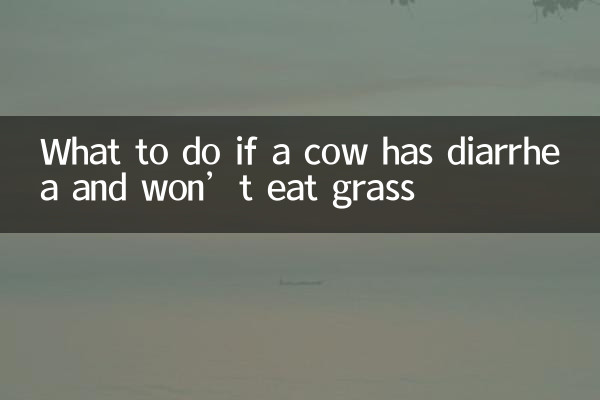What to do if a cow has diarrhea and won’t eat grass
Recently, the issue of cattle having diarrhea and not eating grass has aroused widespread discussion in the field of agricultural breeding. Many farmers have reported that cattle have symptoms such as diarrhea and loss of appetite, which has seriously affected the health of cattle and breeding efficiency. This article will combine the hot topics and hot content on the Internet in the past 10 days to provide you with a detailed analysis of the causes, symptoms and solutions of cow diarrhea, and provide structured data for reference.
1. Common causes of diarrhea in cattle

Diarrhea in cows may be caused by many factors. The following are the most discussed reasons on the Internet in the past 10 days:
| Reason | Proportion | Main symptoms |
|---|---|---|
| feed problem | 35% | Diarrhea, loss of appetite, lethargy |
| bacterial or viral infection | 28% | Fever, blood in stool, dehydration |
| parasitic infection | 20% | Weight loss, parasites in feces |
| environmental stress | 12% | Sudden refusal to eat and mild diarrhea |
| other reasons | 5% | It depends on the specific situation |
2. Typical symptoms of cows having diarrhea and refusing to eat grass
According to recent feedback from farmers and analysis by veterinary experts, cattle having diarrhea and refusing to eat grass are usually accompanied by the following symptoms:
1.Diarrhea: Stool that is thin and may contain mucus or blood.
2.Loss of appetite: Cattle refuse to eat or their feed intake decreases significantly.
3.listless: The cattle’s activity is reduced and their reactions are slow.
4.dehydration: Sunken eye sockets and reduced skin elasticity.
5.weight loss: Not eating for a long time leads to significant weight loss.
3. Solutions and preventive measures
Regarding the problem of cows having diarrhea and refusing to eat grass, the following are the most popular solutions on the Internet in the past 10 days:
| Solution | Applicable situations | Specific measures |
|---|---|---|
| Adjust feed | Caused by feed problems | Replace fresh feed and add probiotics |
| drug treatment | bacterial or viral infection | Use antibiotics or antiviral drugs |
| Insect repellent treatment | parasitic infection | Use broad-spectrum anthelmintics |
| Improve the environment | caused by environmental stress | Keep the barn clean and reduce noise |
| Supplement electrolytes | Dehydration symptoms are obvious | Oral or injected electrolyte solutions |
4. Key measures to prevent diarrhea in cattle
1.feed management: Make sure the feed is fresh and mildew-free, and properly mix roughage and concentrate.
2.Regular deworming: Deworm every 3-6 months to prevent parasitic infection.
3.Vaccination: Get vaccinated against common cattle diseases on time, such as foot-and-mouth disease vaccine, etc.
4.Environmental health: Keep the cowshed dry, ventilated and disinfected regularly.
5.Watch the herd: Observe the feeding status and feces status of cattle every day to detect abnormalities in time.
5. When to seek veterinary help
It is recommended to contact a professional veterinarian immediately if:
1. Cattle diarrhea does not improve for more than 24 hours.
2. There is a lot of blood or mucus in the stool.
3. Cattle exhibit symptoms of severe dehydration.
4. Multiple cattle exhibit similar symptoms at the same time.
5. The body temperature of cattle increases or decreases abnormally.
6. Recent hot topics of discussion
In the past 10 days, the following topics have sparked heated discussions on breeding forums and social media:
1.Application of probiotics in the treatment of cattle diarrhea: Many farmers shared their experience in using probiotics to successfully treat cattle diarrhea.
2.Safety of new feed additives: Some users reported that some new feed additives may cause discomfort to cattle.
3.Impact of climate change on cattle health: Extreme weather has occurred frequently recently, and many farmers are discussing how to deal with cattle health problems caused by weather changes.
4.Comparison of traditional and modern treatments: There is a lively discussion on whether to use Chinese herbal medicine or Western medicine to treat cattle diarrhea.
Through the above analysis and data, we hope to help farmers better understand and solve the problem of cattle having diarrhea and not eating grass. Prevention is better than cure, and good daily management is the key to ensuring the health of cattle.

check the details

check the details